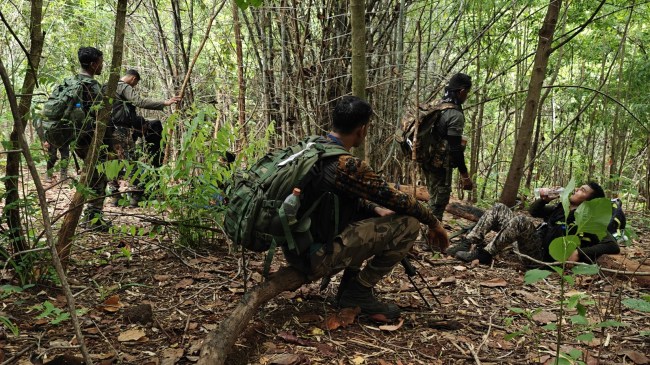Opinion Chhattisgarh CM Vishnu Deo Sai writes: Building a new Bastar
Reducing violence, empowering communities and building infrastructure are steps towards a Bastar that stands tall with dignity and opportunity
 Once heavy with the acrid smell of gunpowder, Bastar’s air today carries the fragrance of mahua flowers, a cherished symbol of tribal life.
Once heavy with the acrid smell of gunpowder, Bastar’s air today carries the fragrance of mahua flowers, a cherished symbol of tribal life. For nearly four decades, Bastar lived under the shadow of left-wing extremism. Today, it stands on the cusp of transformation. Fear is giving way to hope, driven by targeted welfare programmes for the people of the tribal heartland and sustained by strategic security operations.
Rooted in the tribal heritage of Chhattisgarh, our government draws inspiration from the strength and rich culture of its people to build a peaceful and prosperous region. Our goal is clear: To eradicate decades-long extremism by March next year and bring Bastar’s people into the mainstream of development. Our government has been prioritising direct engagement with the people of the region since we assumed office in 2023. I have visited Bastar 77 times so far, primarily to give shape to schemes that address local needs.
These visits are more than administrative duties. They are heartfelt efforts to walk alongside villagers, listen to their aspirations, and ensure progress reaches their doorsteps. The trust of Bastar’s majority tribal population in the government has increased after they have seen the administration, led by one of their own, deliver tangible results. This connection has convinced communities that my government is committed to action and to healing the wounds of the conflict.
Once heavy with the acrid smell of gunpowder, Bastar’s air today carries the fragrance of mahua flowers, a cherished symbol of tribal life. Markets that were once deserted are today vibrant hubs of commerce. Schools, shut down by insurgents, are now welcoming students. More than 50 primary schools have been reopened and seven new ones established in Sukma. Roads, once under the grip of extremists, are now bustling with life.
Bastar’s return to normalcy and development has led to the establishment of a branch of the Indian Overseas Bank in Jagargunda, a remote and historically volatile region that has faced decades of insurgency. This initiative will provide access to banking facilities for residents across 12 villages.
Celebration of traditional tribal festivals like Bastar Pandum, along with the Bastar Olympics, testify to the region’s desire to embrace development while cherishing its heritage. This transformation is a result of the collaboration between the Centre and the state.
In the past 17 months, 1,355 extremists have surrendered and have opted for rehabilitation and a better life. Around 1,429 others have been apprehended, and more than 420 extremists have been neutralised. The network of extremists has weakened substantially. The state’s police report notes a 40 per cent reduction in violent incidents.
Chhattisgarh’s new policy — it guarantees rehabilitation within 120 days — offers vocational training and financial aid to those who lay down arms and helps them join mainstream society. Our government has prioritised the delivery of essential services to the region’s remotest villages. Additional forces will be deployed to ensure the safety of the local people and the unhindered execution of development works.
The Niyad Nella Nar Yojana, “Aapka Accha Gaon” in the local dialect, launched in February 2024 with a Rs 20-crore budget, brings government schemes directly to tribal households in 130 Maoist-affected villages. It provides access to healthcare, education, security, and infrastructure through 61 security camps-turned-facilitation centres. Forest Department offices, closed for 25 years, have been reopened in Jagargunda and four other places, restoring governance in Bastar’s core forest zones.
Under the PM Awas Yojana, over 50,000 pucca houses have been built, offering tribal families safe and dignified living spaces. The Jal Jeevan Mission has provided clean tap water to approximately 1.2 lakh households, improving health and quality of life.
Recognising the importance of forest-based livelihoods, our government has increased the prices of tendu patta — it is used for bidi production — from Rs 4,000 to Rs 5,500 per standard bag. These efforts are tailored to the needs of Bastar’s diverse tribal communities, including Gond, Maria and Muria. Through initiatives like the Jan Ashirwad Yatras and public outreach campaigns, our government has heard people’s grievances. Significant funds have been allocated through the Bastar Development Authority to drive growth across the region, including for Kondagaon, Bastar, Kanker, Bijapur and Narayanpur. Additional resources have been provided to Sukma district.
Our government is committed to building a future where Bastar thrives as a hub of opportunity. Over 300 km of new roads are under construction, connecting remote villages to markets and services, and fostering economic growth. Industrial Training Institutes and skill development centres are training Bastar’s youth to succeed in a modern economy. By promoting ecotourism and showcasing the region’s rich tribal culture, our government aims to create sustainable livelihoods while inviting the world to witness Bastar’s beauty.
Reducing violence, empowering communities and building infrastructure are steps towards a Bastar that stands tall with dignity and opportunity. The day is not far when the stain of left-wing extremism will be erased from the region, and its tribal communities will celebrate development and embrace a peaceful and prosperous future.
The writer is Chief Minister, Chhattisgarh




